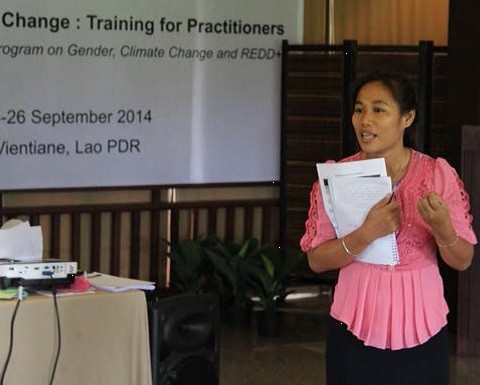Speeches Shim

October 2015—Women—an untapped yet central resource in addressing climate change—are stepping forward to be more involved in decisionmaking in Asia, and Chinneth Cheng is one of them.
The eldest of three daughters, she grew up in a farming family near the Mekong River in Cambodia. Doem Sdao, a rural, agricultural community, was poor and isolated. Cheng never heard of gender equality until she was recruited to join the Cambodia Ministry of Women’s Affairs in 2007. Her education in law and development cooperation led her superiors to give her a leadership position on gender and climate change.
“I quickly learned to understand the concepts of gender integration, how to assess gender gaps in our work and, most importantly, how to begin mainstreaming it into government policies,” said Cheng.
With increasing temperatures, rising sea levels, changing rainfall patterns and more frequent and severe weather events, there is a growing need to help vulnerable populations adapt to the negative effects of climate change. Women are often left out of decisionmaking processes and lack financial resources to enhance the resilience of their households, communities and countries.
But women have on-the-ground knowledge that enables them to contribute to long-term solutions. This expertise to deal with climate variability is still largely unused.
The Ministry of Women’s Affairs tasked Cheng with engaging other ministries, NGOs and development programs on gender equality in climate change issues. Her professional duties and growing personal interest in this area led her to participate in the USAID Lowering Emissions in Asia’s Forests (USAID LEAF) program’s Asia-Pacific Leadership Initiative on Gender and Climate Change. She has been involved in the gender champions program since its inception in 2013.
“The USAID LEAF trainings have improved my skills, and those of my colleagues from other countries,” said Cheng. “We will be role models in our offices and lead the effort to ensure gender equity in climate change policies and programs.”
She and her colleagues completed the ministry’s first climate change action plan that will feature an assessment of the effects of climate change, specifically focusing on rural women in Cambodia. Women are often adversely impacted given their roles in growing and collecting food and ensuring water supply for their families. Activities in the action plan will serve as a model for other ministries to better integrate gender into their own climate change action plans.
“I am no longer alone in believing women have as great a role to play as men in addressing climate change,” said Cheng. “Knowledge and skills I have gained from USAID programs have inspired me to keep advocating for greater gender integration in the climate change work in my country.”
LINKS
Follow @USAIDAsia, on Facebook, on Flickr, on YouTube

Comment
Make a general inquiry or suggest an improvement.